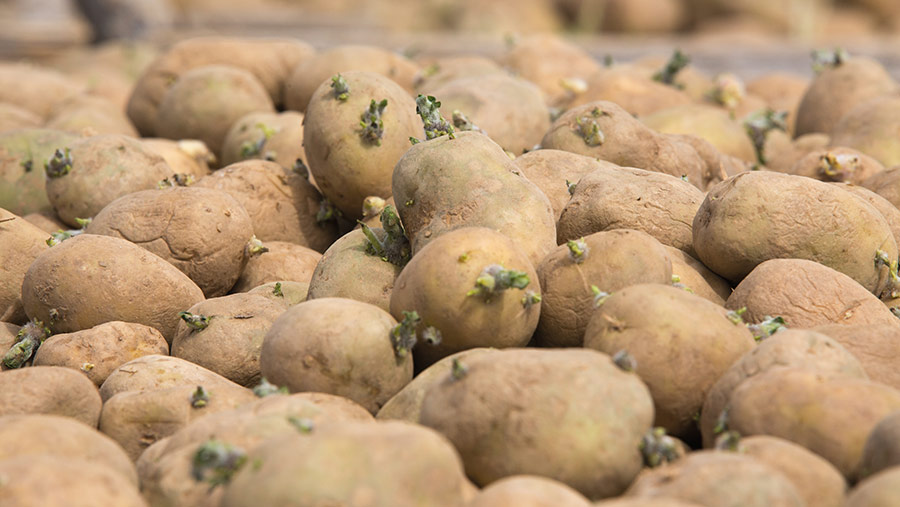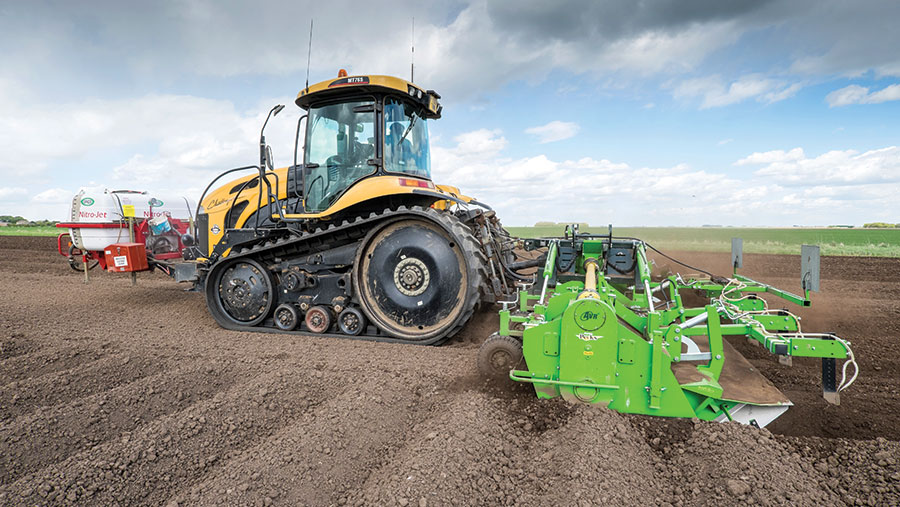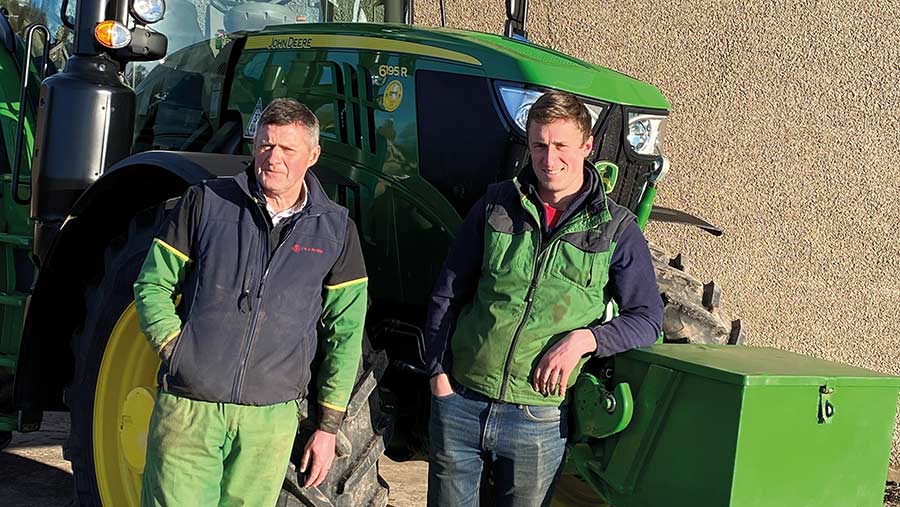How the seed potato industry is reacting to loss of EU market
 © Tim Scrivener
© Tim Scrivener The UK leaving the EU has put paid to UK annual exports of about 22,000t of seed potatoes, worth in excess of £10m to the EU, leaving seed growers with tough decisions on their cropping plans for this coming spring.
Most are grown in Scotland, where the cool, damp climate is advantageous for reducing virus pressure and other key diseases to produce high-quality seed.
See also: Key considerations for sugar beet weed control this season
Why have seed potato exports to the EU stopped?
After the end of the Brexit transition period, Britain was classified under EU trade rules as a “third country”. Under EU Commission rules, “sensitive products” – which seed and ware potatoes as classified as – require separate technical listings for trade to be allowed from third countries.
This essentially means the commission recognising the UK’s regulatory, supervisory and enforcement regimes as equivalent to its own, explains Patrick Hughes, head of export trade development for AHDB Potatoes.
“While this has been achieved for ware potatoes, unfortunately the EU has not accepted the case for seed potatoes, meaning this trade is banned.”
The Northern Ireland Protocol means that in addition to exports to the EU, movement of seed potatoes from GB to Northern Ireland is also banned.
Is there any chance of a resolution?
Optimism is waning, says Sandy McGowan, British Potato Trade Association president and manager of Cygnet PEP, which exported about 15% of its annual supply of 28,000t of basic seed potatoes into the EU.
Defra had tried to trigger Article 44 of the Plant Health Regulation, which would have potentially allowed a phytosanitary derogation that would allow trade to continue, he says.
That was due to be heard at a Standing Committee on Plant Health (SCOPAFF) technical committee meeting in late January, but the EU Commission decided to reject the application a day before the planned meeting, as the UK’s plant health policy is not dynamically aligned with the EU.
Dynamic alignment would mean the UK following all regulations set in the EU, which politically will be challenging for the UK government, he says.
“We would also no longer have a representative that sits on any of the committees that decide these standards. We would be giving away control of our own seed potato classification scheme regulations.
“For example, if a decision was made to reduce tolerance for blackleg, we would be powerless to stop it and, technically speaking, breaking the law to certify any of our seed potatoes to our own certification scheme standards.”
While Defra is still trying to plead the UK’s case, it seems that this is a political decision rather than a technical one, Mr McGowan claims. “We’re left in complete limbo as GB seed producers, as we don’t know if we will have access to that European market.”
He says his optimism is waning. “The language being used by the commission and bureaucratic process is proving to be a major stumbling block, and it feels like we’re being made an example of.”
Are there seed potatoes left to export from last season’s crop?
While many exporters foresaw the potential ban and moved as much stock as possible to the EU before Christmas, at an unknown extra cost, there are still several thousand tonnes of seed potatoes that have not been moved, especially from smaller farmer/traders with customers in Ireland.
Those potatoes cannot be stored beyond this spring, so growers will be searching for alternative markets, he says.
“While supermarket/retail consumption is up, everything else is down. You cannot turn a crisping potato into a packing potato, so there isn’t going to be markets for all of this. A lot will end up being fed to cattle, put into biodigesters or even landfill.”
What about seed potatoes imported from the EU?
The UK government, with support from various potato associations, agreed a temporary extension of the previous arrangements allowing the import of seed potatoes into the UK from the EU.
“That was granted for six months, until the end of June,” says Mr McGowan. He adds that it was the right thing to do and allows English growers and supply chains to get seed supplies sorted for the 2021 planting season.
One of the reasons the extension was granted is that there is a selection of genetics and varieties from the EU that fit into supply chains, such as varieties for crisping and processing factories or specialist lines for supermarkets, he says.
Will there be a reciprocal ban in future?
Some form of symmetrical arrangement – whether it is starting trading again, or a reciprocal ban on imports from the EU – has to be made, Mr McGowan says.
“We need some form of balance. We can’t have a position where we are not able to export 22,000t to the EU, but are still allowing 30,000t of imports. To allow that would be economic suicide.”
The Pre Basic Growers Association has already written to Defra to ask for a ban if reciprocal trading cannot be agreed.
What does this mean for seed potato growers who usually grow for an EU market?
Firstly, discuss potential implications and requirements with your supply chain, says Mr McGowan.
“For Cygnet PEP, we produce a large tonnage that goes to countries outside the EU, and the EU was there to mop up tonnage that didn’t make the higher quality criteria of those markets, as well as some additional tonnage for that market.”
Realistically, he says, they are going to have to consider seriously cutting back the area of these varieties, and asking their growers to only grow for these high-end, high-quality markets, which is more challenging.
Another possibility is producing for the UK market, but that may require different varieties to be grown.
For example, Hermes is a popular variety for the North African market, but about 1,000-1,500t is also exported into the EU, which is unlikely to be suitable for UK growers, he says.
“There is going to be a shift in varieties and supply chains.”
But there is still time with the import extension to secure key varieties necessary for processing and packing, bring them into the UK and have them grown as seed varieties until mini-tubers can be commissioned or plantlets brought across.”
Ware potato growers also need to be prepared, particularly if they purchase seed from the EU. Blackleg clean seed, for example, is one potential advantage of seed purchased from the EU.
Again, early conversations with suppliers will be important, with a possible ban on imports from 1 July.

© Tim Scrivener
What about accessing new genetics from European seed potato breeders?
After the six-month extension is over, there will be a “symmetrical arrangement” with the EU, which would mean mini-tubers would not be moved between the GB and EU, Mr McGowan says.
“But plant genetics can still come in, although there will be extra paperwork and cost.”
Some form of dynamic alignment with the EU to allow both genetics from UK programmes to be trialled and multiplied up in the EU, and vice-versa, would make sense, he suggests. “We do benefit greatly from genetics from the EU.”
Will there be a reduction in the amount of seed potatoes grown this season?
Mr McGowan doesn’t expect the area of seed potatoes to reduce, despite the challenges, although that does rely on trade being allowed, or the reciprocal ban on imports coming into force.
“I do see there being a progressive change in varieties and in practices – such as storage, packaging and husbandry – to help supply a different market to what some will have been doing.”
Case study: Alistair Melrose, J&E Smillie, Perthshire
The sensible reaction would be to not take on offered rental land, and reduce area and risk, says Alistair Melrose, commercial director for J&E Smillie in Perthshire.
The farm grows about 280ha, or 7,000t, of seed potatoes on rented land in Perthshire and Kincardineshire for export to Egypt, Morocco, the Canary Islands, Ireland and Israel, as well as delivering to English growers mostly based in the eastern counties.
The firm also markets production from about the same area for a further seven growers.

© Melrose
About 500-1,000t goes to customers in Spain and France, either as surplus production or as an alternative market where the seed hasn’t made the higher specification required for export to north Africa, Mr Melrose explains.
“We’ve already lost customers, who have no storage in Spain and Portugal. One has bought from a Dutch supplier for this season so, effectively, we’ve lost that customer for ever.”
The firm also exports traditional varieties, such as Maris Piper, to growers in Northern Ireland and the Republic of Ireland. “That might be our biggest hit.”
The loss of these export markets is creating a huge amount of uncertainty for the coming season. “It’s compounded by uncertainty over what Egypt will take, while the market in Morocco has been poor too. So planning is difficult.
“The sensible part of me says don’t take some of the land we’ve been offered, but the competition for rental potato land here is fierce, so if we don’t take it, it won’t be available for another year.”
Mr Melrose admits he isn’t sure what to do. “I’d rather have a customer before putting potatoes in the ground, instead of planting speculatively.”
Varieties primarily targeted at EU customers, such as Stemster, may not be viable to plant, he says.
If EU trade continues to be prohibited, he would like a reciprocal ban in place to allow the opportunity to replace some of that trade with home-grown seed. But it is not straightforward to change, he acknowledges.
Not all of those varieties are suitable for production in Scotland, but they could be grown in Yorkshire or the South West, he says.
“In Scotland, we will have to take another look at and improve how we can grow these varieties.”
